The 75th World Health Assembly and the urgency of reaching Health Equity For All
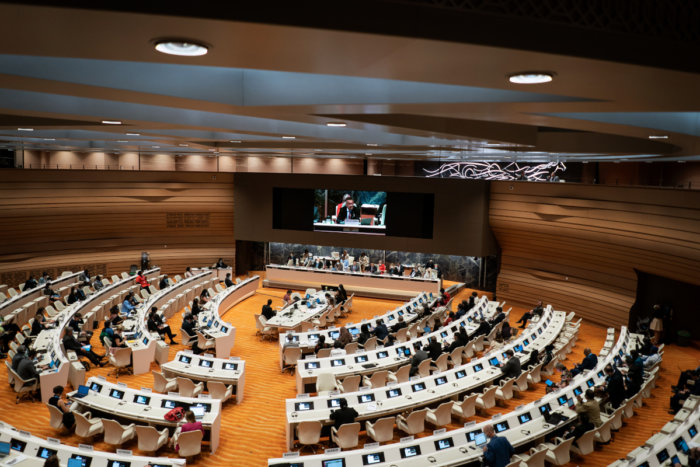
Seventy-fifth World Health Assembly, Geneva, Switzerland, 22-28 May 2022. © WHO/ Laurent Cipriani
Over the last 20 years, healthy life expectancy increased by more than 5 years, according to the World Health Statistics 2022. 270 million more people should benefit from Universal Health Coverage by 2023.
While people are living longer and healthier lives, the widespread impact of the #COVID19 pandemic, the current global economic recession, and consequently steeper inequalities, threaten to undo the hard-won progress. More people are now unable to access care because they cannot afford it.
From May 22 to 28, the 75th World Health Assembly was held in Geneva, Switzerland.
As the first in-person Health Assembly since the start of the COVID-19 pandemic, the main decision-making body of WHO gathered delegates from its 194 Member States around the theme “Health for peace, peace for health”. Events began with high-level speeches from the elected Health Assembly President, Heads of State, special guests, an address by the WHO Director-General, and the presentation of the Director-General’s Health Awards.
WHO shared the achievements over the past two years against each of the “triple billion” targets through the WHO Results Report for 2020-21.
Afterwards, bringing together delegates, WHO experts, partner agencies and civil society, a series of Strategic Roundtables were held to discuss current priorities and next solutions on vital issues for global public health. Among the topics: investing in a sustainably financed WHO, the economics of Health for All, and a new proposed architecture for health emergency preparedness, response, and resilience.
WHO’s current financing model had been identified by many experts as posing a misalignment between organizational priorities and the ability to finance them. Predictable and sustainable funding enables WHO to deliver long-term programming in countries at the scale needed to build towards health for all.
Following the introductory sessions, the WHA adopted a landmark decision to improve WHO’s financing model. Member States now target a gradual increase of their membership dues to represent 50% of WHO’s core budget by the 2030-2031 budget cycle, at the latest.
The shift will tentatively start with WHO’s 2024-25 budget, with a proposed 20% increase over the assessed contributions in the approved 2022-23 base budget.
More predictable & sustainable funding for WHO makes economic sense for the Organization’s contributors – a new investment case launched during the week shows that every US dollar invested in WHO delivers a return on investment of at least USD35. A Healthy Return details how investing in health helps build safer and more equitable societies with huge benefits for employment, productivity, poverty reduction, and development.
The WHO Foundation welcomes this change and is committed to support WHO to marshal new resources from philanthropists, foundations, businesses, and individuals to complement Member States’ contributions.
Regarding Pandemic response, a new programme budget revision was approved to reflect the rapidly changing health situation of the world due to the COVID-19 pandemic, amongst other issues.
Delegates welcomed the final report of the Working Group on strengthening WHO preparedness and response to health emergencies which, among other things, proposed a process for taking forward potential amendments to the 2005 International Health Regulations (IHR). The Working Group will propose a package of targeted amendments for consideration by the Seventy-seventh Health Assembly.
The impact of the conflict in Ukraine was reported highlighting the devastating direct and indirect impacts on people’s health and the functioning of the health system.
Other major announcements were made, such as the re-election of Dr. Tedros Adhanom Ghebreyesus for a second term as WHO Director-General. The foundation is delighted by the news, as Dr. Tedros’ vision and dedication will continue to inspire WHO staff and WHO partners towards reaching Health For All.
During WHA, the WHO Foundation leadership conducted several bilaterals with a strong focus on philanthropies, private sector, and the WHO Regional Teams. Anil Soni, CEO of the WHO Foundation, met with the Regional Directors of the WHO Eastern Mediterranean Region, of the WHO African Region and of the Pan-American Health Organization.
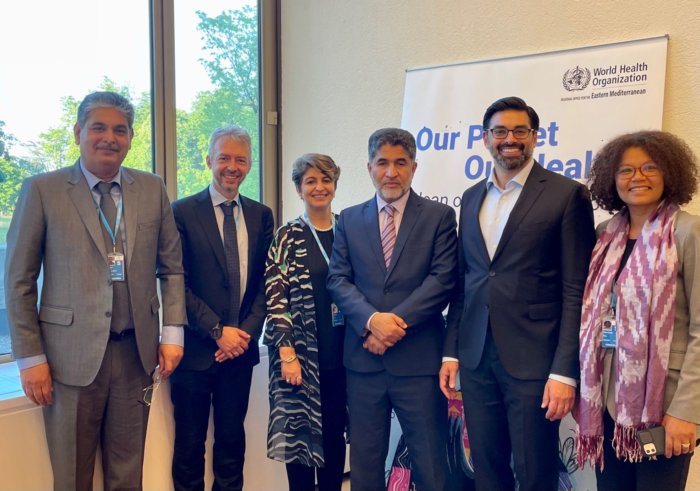
WHO Foundation colleagues with a team from WHO’s Regional Office for the Eastern Mediterranean.
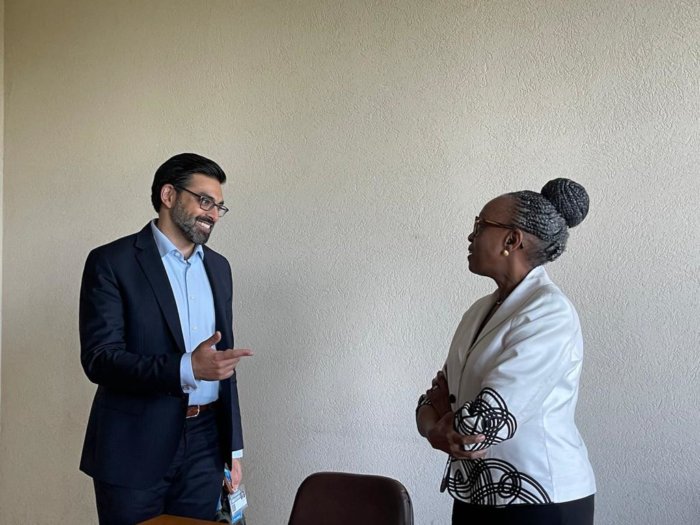
Anil Soni, WHO Foundation CEO and Dr Matshidiso Moeti, WHO Regional Director for Africa.
Simultaneously, our teams also attended this year’s World Economic Forum in Davos as it was of vital importance to firmly place global health and the lifesaving work of the WHO as a core topic.
We were present to raise awareness on why building a healthier future for people around the world demands coordinated efforts on a scale that has never been seen before. The WHO Foundation covered a range of topics, from lessons learned from the pandemic, and why we need different solutions to tackle health inequity, to impact investment and innovative finance for global health, but also discussions about the need for a stronger global architecture for pandemic preparedness, response & resilience.
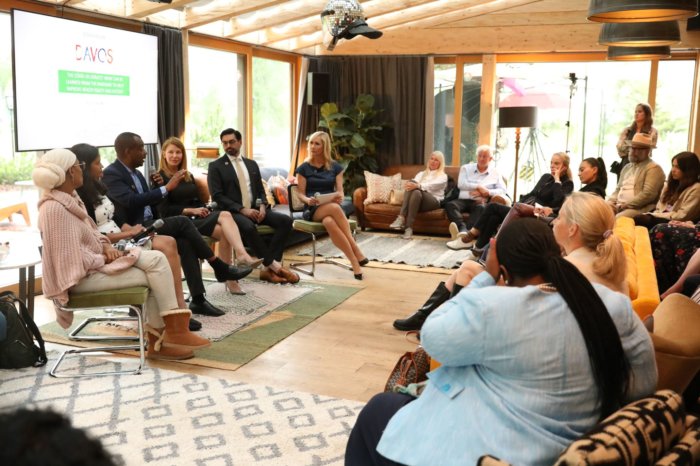
During the World Economic Forum in Davos: Our CEO Anil Soni took part in a panel alongside Gates Foundation’s Paulin Basinga, Salesforce’s Denise Dresser, Access to Medicine Foundation’s Jayasree Iyer, and Umra Omar from Safari Doctors.
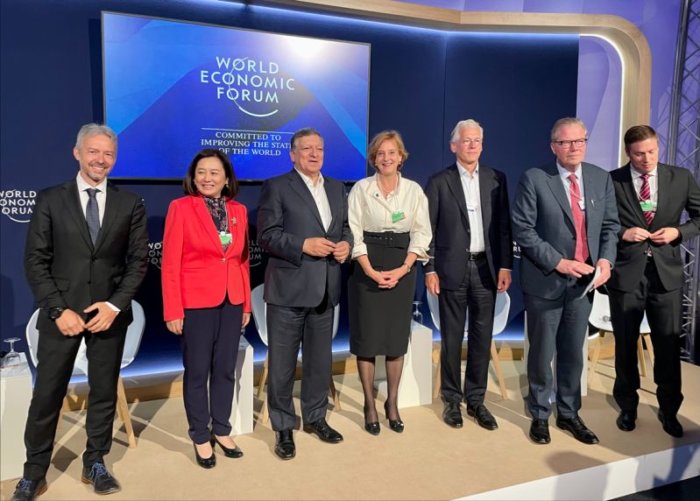
During the World Economic Forum in Davos: Our Chief Strategy & Impact Officer Emanuele Capobianco with José Manuel Barroso, and top executives from Philips, Astra Zeneca, KPMG.
The WHO Foundation continues to harness the power of partnerships to raise funds and nurture collaborations for the mission of WHO, focusing on our key areas: Emergencies, Mental health, Digital health, as well as our campaigns like GoGiveOne for vaccine equity, the Ukraine emergency health appeal or COVD-19 response.

